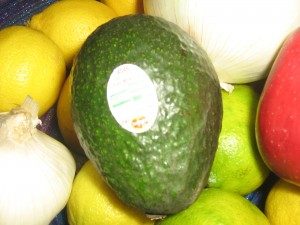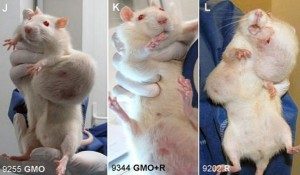
Produce stickers identify GMO products that are shown in laboratory rats to cause tumors. Those little produce stickers with numbers on them are Price Look-Up numbering codes or PLU codes. They ensure that the correct price is paid by consumers at check out by identifying the product type, size, where it was grown and if it was grown conventionally, organically or genetically modified. These codes are administered by the International Federation for Produce Standards (IFPS), who maintain a list of five-digit codes (which are sometimes four digits, because leading zeroes are typically not displayed) that identify qualities associated with the product.
This is the numbering system at a glance:
Conventionally grown produce: 4 numbers
Genetically modified produce: 5 numbers starting with the number 8
Organically grown produce: 5 numbers starting with the number 9

If you care about your health you will want to steer clear of genetically modified foods. Food that is genetically modified means that the original DNA structure has been changed. It was introduced as a way to make plants more resistant to herbicides. This way, farmers could spray their fields with herbicides killing all the weeds without affecting the crops.
A French study published on September 19, 2012 in “Food and Chemical Toxicology” shows that mice who ate genetically modified corn sprayed with weed killer were more likely to develop tumors, organ damage and die early.

The two-year study, revealed that rats who were fed either a diet of Monsanto’s genetically modified maize sprayed with Roundup – the company’s brand of weed killer – or drank water with levels of Roundup similar to what is found in U.S. tap water were much more likely to die. According to the USDA Economic Research Service, as of 2011, 76 to 96 percent of corn crops in the United States have had some sort of genetic modification, depending on which state they were grown.
The study involved 200 albino Sprague-Dawley rats – 100 hundred females, 100 males. The rats where then divided into groups of 10. Six of the groups were fed varied diets with genetically modified products. Six groups – three male and three female – were fed Monsanto GM maize with Roundup weed killer consisting of 11 percent of their diet, 22 percent or 33 percent. Six other groups were given Monsanto GM maize in the same percentage amounts, but had no Roundup sprayed on them. Another six groups were given Roundup weed killer in their water similar to the levels found in U.S. tap water.
The remaining two groups acted as control groups and were fed non-genetically modified maize and water without Roundup weed killer.
The results showed that female rats were two to three times more likely to die than the control group. Fifty percent of the males and 70 percent of the females eating Monsanto GM maize died earlier compared to 30 percent of males and 20 percent of females not eating genetically modified products. Female rats seemed to be more negatively affected by genetically modified corn diets whether it was sprayed with Roundup or not.
Tumors were late-developing, large mammary tumors, and the affected rats suffered from severe liver and kidney damage. The tumors did not metastasize or spread to other body parts, but were so large they blocked organ function in the rats.
There is a new kind of genetically modified crop under the brand name of “Enlist”. It has opponents pushing U.S. regulators to scrutinize the product more closely and reject an application by Dow AgroSciences to roll out its herbicide-resistant seeds.
The corn has been genetically engineered to be immune to 2, 4-D, an ingredient used in Agent Orange that could pose a serious threat to human health. Approval by the United States Department of Agriculture and Environmental Protection Agency would allow farmers to spray it without damaging their crops, boosting profits to Dow AgroSciences.
The scientific community has sounded alarms about the dangers of 2, 4-D for decades. “Numerous studies link 2, 4-D exposure to major health problems such as cancer, lowered sperm counts, liver toxicity and Parkinson’s disease. Lab studies show that 2, 4-D causes endocrine disruption, reproductive problems, neurotoxicity, and immunosuppression.”
Some farmers have argued that the new herbicide, a combination of 2, 4-D and glyphosate, the active ingredient in Monsanto’s bestselling Roundup weed killer, is necessary to combat weeds that have become resistant to glyphosate alone. However, glyphosate is also under public scrutiny in the wake of scientific findings that demonstrate this chemical to cause birth defects in the embryos of laboratory animals. Health professionals contend that 2, 4-Dichlorophenoxyacetic acid (2, 4-D), an ingredient in the Vietnam War-era defoliant that’s been blamed for public health problems both during and after the war, poses its own risks.
So the next time you are shopping for produce, you might want to pay attention to those PLU codes on the little stickers. Unfortunately the use of PLU codes is optional so many produce items don’t have them. If genetically modified food suppliers think consumers won’t knowingly by their food, they can just eliminate the use of the sticker all together.
Purchase only items that are specifically labeled as “Organic” or SUDA certified as “100% organic” (which cannot by law be produced from GMOs) or with produce stickers starting with the number 9 to be sure you are avoiding genetically modified produce.